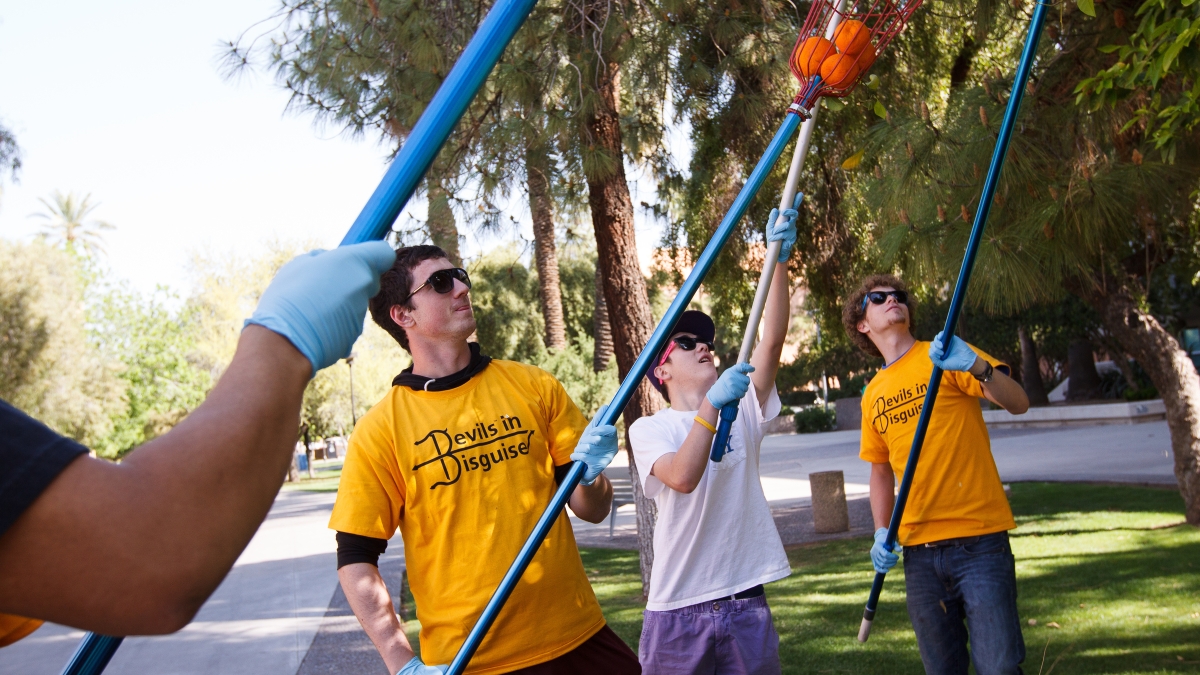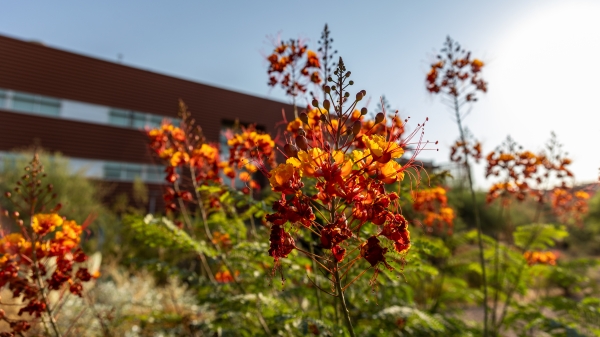Putting the squeeze on sustainability
Sour orange harvest offers volunteer opportunity; oranges processed at local facility for use in campus dining locations

Ashley Hutchinson knows the orange juice served in Arizona State University dining halls came from fruit hand-picked off Tempe campus trees. The only thing she does not know is whether the juice she drinks came from the same oranges she helped pick.
For the past three years, Hutchinson — a family and human development senior — has participated in the Seville sour orange campus harvest. The harvest is a partnership between ASU Grounds Services, Aramark and Sun Orchard, a Tempe-based processing facility operated by ASU alumna Lindsay Fujita.
More than 100 volunteers, including ASU students, faculty, staff and alumni, converge each February to collect oranges from 140 trees on the Tempe campus. This year’s harvest is Feb. 5–7.
“Giving back to ASU and the local community has been a huge part of my Sun Devil story because I recognize that giving back and sustainability go hand in hand,” said Hutchinson, a recipient of the Medallion Scholarship that emphasizes community service and academic achievement. “Both require putting more back into the world around us than we take.”
The campus harvest for Seville sour oranges started in 2008. Before then, ASU sent the oranges to Canada, where they were processed into marmalade. When the U.S. marmalade industry waned, the oranges remained on campus and Aramark began juicing them in-house.
Sun Orchard teamed up with the university in 2014 to help wash, sort and squeeze the oranges into a usable product. The 100 percent pure juice is shipped back to campus in gallon containers for Aramark to use in its kitchens. Sun Orchard produces an estimated 380 gallons of sour orange juice from more than five tons of oranges.
“We often forget that sour oranges are a cooking fruit and can be used in a variety of foods,” said Deborah Thirkill, ASU Grounds Services program coordinator and overseer of the sour orange harvest. “Having the campus harvest program allows us to offer a real farm-to-table experience while inviting the ASU community to be a part of that process.”
In addition to dressings and marinades, the sour orange juice can be used in sweet and savory dishes such as orange-glazed pork loin, orange candied yams, orange chocolate bark and whoopie pies.
The Seville sour orange campus harvest also earned the 2015 President’s Award for Sustainability, which recognizes outstanding university organizations that develop sustainable principles, services and programs to support ASU’s core missions.
The ASU community may more commonly encounter the sour orange juice as DevilAde. ASU’s unique orange juice blend is available in all ASU residential dining halls. DevilAde also is sold at the e2 Cafe on the Tempe campus, the ASU Farmers Market and through Decidedly Green, ASU Catering’s sustainable menu.
“We have had excellent attendance from our alumni and their families at the sour orange harvest for years,” said Tonya Gray, ASU Alumni program coordinator. “This event is an excellent opportunity for our alumni to come together to help support their alma mater, interact with current students and further ASU's sustainability initiatives.”
Volunteers interested in joining this year’s sour orange campus harvest may sign up before Feb. 4 for two-hour shifts.
If the spring harvest is not an option, campus dates are harvested each fall. ASU boasts the largest date palm collection of any public garden in the country with more than 40 date palm varieties including Medjool, Black Sphinx and Zahid. Volunteers handpick and package the dates during September and October. The dates are sold during the holiday season in campus bookstores.
For more information, or to volunteer for the date or orange harvests, contact Deborah Thirkill at 480-268-4165. Follow the ASU Arboretum on Facebook and Twitter.
Top photo: Volunteers participate in the Seville sour orange campus harvest as part of Devils in Disguise.
More Environment and sustainability

Study: Conservation actions highly effective at halting, reversing biodiversity loss
A new study, led and contributed to by Arizona State University faculty, provides the strongest evidence to date that not only is nature conservation successful, but that scaling up conservation…

Barrett Honors College to host nature walks for science, relaxation
Barrett, The Honors College at Arizona State University is gearing up to participate in the City Nature Challenge (CNC) for the fourth consecutive year. This annual event, taking place April 26–29,…

Arizona adapting to heat crisis with initiatives featured in ASU report
Arizona State University's Knowledge Exchange for Resilience, also known as KER, released its Recommendations Report on Extreme Heat Preparedness earlier this April during a summit in the nation's…